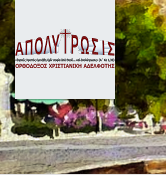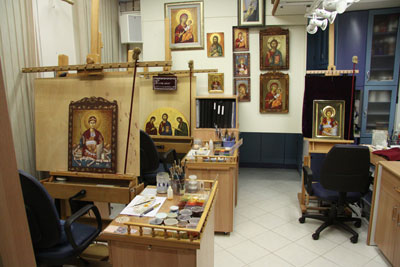 ΑΠΟΛΥΤΡΩΣΙΣ
ΧΡΙΣΤΙΑΝΙΚΗ ΟΡΘΟΔΟΞΗ ΑΔΕΛΦΟΤΗΣ
ΑΠΟΛΥΤΡΩΣΙΣ
ΧΡΙΣΤΙΑΝΙΚΗ ΟΡΘΟΔΟΞΗ ΑΔΕΛΦΟΤΗΣ

Greek Church Fathers (10)
Why should a Man Tolerate a Woman’s Faults and Comfort her in her Failures?
Γράφτηκε από Super UserSaint John Chrysostom
(Speech on 1 Corinthians 26,11, ΕΠΕ 18 Α,176 - ΜG 61,223-224 η’)

But what if she is talkative and drunk and angry? Well, you must not be angry with her, but take care of her and pray to God and exhort her and counsel her and do everything to break her passion. But if you beat her, you make her situation worse. For insolence is not cured by insolence, but by forbearance and yielding. Besides the above, think of the reward God has in store for your patience. For though you have the power to send her away, and do not do so because you fear God, but put up with so many faults because you fear the law, which prevents you from expelling the woman whatever her fault may be, you shall receive a very great reward.
But even before the reward that God will give you, you will have a very great benefit, because you will also make her more disciplined, and because of her you will become more lenient. It is even said that one of the pagan philosophers, who had a wife who was vicious and talkative and drunk, when asked why he tolerated the behaviour of such a woman, he replied: I tolerate her so that I may have a gymnasium and a fighting ring in my house, so that they may train me in the patient life. For in this way, he said, I shall also be gentler to others, for I shall practise meekness daily in the house.
Conjugal Love is the Foundation of Family Happiness
Γράφτηκε από Super UserSaint John Chrysostom
(Speech on Genesis 55, 3, ΕΠΕ 4, 134 – MG 54, 416-417)
 This is a true marriage, when there is a great deal of agreement between the two spouses, when there is a close connection, when they are very tightly bound in love. That is, just as the body can never rebel against itself, nor the soul against itself, so the man and the woman must not be separated and in conflict, but must be united. For only then it is possible for them to accumulate innumerable goods.
This is a true marriage, when there is a great deal of agreement between the two spouses, when there is a close connection, when they are very tightly bound in love. That is, just as the body can never rebel against itself, nor the soul against itself, so the man and the woman must not be separated and in conflict, but must be united. For only then it is possible for them to accumulate innumerable goods.
Saint John Chrysostom
(Speech on Genesis 55, 2, ΕΠΕ 4, 388 – MG 54, 481)
Jacob worked for Rachel for seven years, and it felt like a few days because he loved her. The seven years seemed like a few days to him because of the excessive love he had for the girl. When one is wounded by the craving of love, they see none of the difficulties, but they bear easily all dangers and many sufferings because they aim at one thing only: satisfying their desires.
St John Chrysostom answers questions about the Birth of Christ (Nativity)
Γράφτηκε από Super UserSelected excerpts from the Saint’s sermons on passages from the Gospel according to St Matthew
♦ How is it evident that He is a Descendant of David?
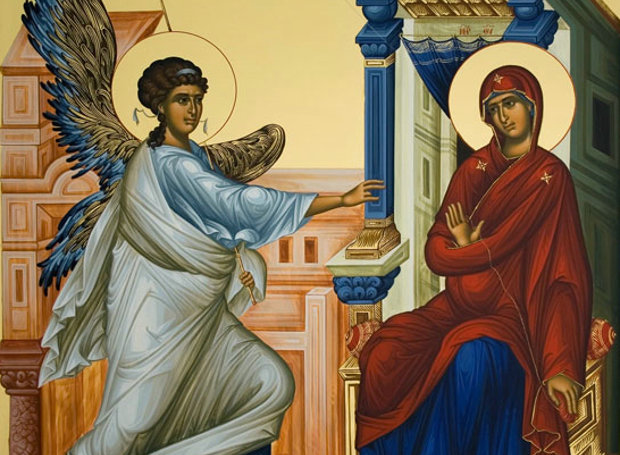 In the Gospel according to St Luke (1:27) we read the command God gives to Gabriel to go “to a virgin engaged to a man named Joseph, a descendant of David”. What is then clearer than this, when we hear that the Virgin descends from the line and family of David? Both Joseph and Virgin Mary came from the royal line of King David. It was the custom of the Jews to include only men in their genealogies, so from the genealogy in the Gospel according to St Matthew (1:16) we are assured that Joseph descends from the royal family of David. In the Old Testament it was not only forbidden to take a wife from another tribe, but also from another family. Therefore, whether we attribute the phrase “a descendant of David” to the Virgin or Joseph, their common origin is certain.
In the Gospel according to St Luke (1:27) we read the command God gives to Gabriel to go “to a virgin engaged to a man named Joseph, a descendant of David”. What is then clearer than this, when we hear that the Virgin descends from the line and family of David? Both Joseph and Virgin Mary came from the royal line of King David. It was the custom of the Jews to include only men in their genealogies, so from the genealogy in the Gospel according to St Matthew (1:16) we are assured that Joseph descends from the royal family of David. In the Old Testament it was not only forbidden to take a wife from another tribe, but also from another family. Therefore, whether we attribute the phrase “a descendant of David” to the Virgin or Joseph, their common origin is certain.
This righteous and virtuous man, distinguished for his great compassion, he who did not pursue the Virgin’s punishment, could not have possibly transgressed the Law about marriage. He who showed a level of spirituality higher than what the Law required, as revealed by his plan to divorce the Virgin secretly, could not have possibly broken the Law in choosing his wife, when indeed he was not compelled by any reason to do so.
♦ Why is Joseph included in the genealogical tree of Jesus Christ since he did not really have Virgin Mary as his wife?
The phrase “Joseph, the husband of Mary (Mt. 1:16) in the genealogy of Joseph, after naming all his ancestors, indicates that the Evangelist included him in the genealogy because of Mary. But lest you should think that the birth of Jesus Christ occurred following the natural law, when hearing the phrase “husband of Mary”, he presents the miraculous and supernatural way of the virginal conception of Jesus as follows: “After His mother Mary was engaged to Joseph, before they came together, she was found with child by the Holy Spirit” (Mt. 1:18).
The Jews should not have known at the time of the Nativity that Christ was born of a Virgin so that the Virgin could be saved and be free of any immoral suspicion. Because, if this had been known to the Jews from the very beginning, they would have condemned the Virgin for adultery and sentenced to death by stoning. Since Joseph himself, who was both a pious and admirable man, needed many proofs to believe what happened, namely the appearance of an angel and the revelation in his dream along with the testimonies of the prophets, how would it be possible for the Jews, being stiff-necked, wicked and fanatical enemies of Him, to accept this unbelievable event? They would be scandalized by this paradoxical and incredible event similar of which had not been witnessed in the past. “Her husband Joseph, being a righteous man and unwilling to disgrace her, decided to divorce her secretly.” says Matthew (1:19)
Do you see how merciful this man was? Not only did he not punish her but also, he did not denounce to anybody nor did he even say anything to the Virgin whom he considered a suspect. Instead, he was thinking to himself while trying to hide the accusation even from the Virgin herself. To that end the Evangelist did not say “sent her away from his house” but “dismiss her”. He planned to divorce her. He was such a merciful, polite and decent man, righteous in all things, that he did not want to cause any discomfort to the Virgin, not even the slightest one. Since however, he believed that it was unethical to have her in his house, while at the same time her public shaming would have resulted in a death penalty, he showed superior behavior. He “decided to divorce her secretly”.
♦ Why did the Virgin keep it quiet, when she was informed by the angel and why did she not disclose it to her suitor when she saw him confused?
That is because she thought that she would not be believed by her suitor, if she announced such oddity. On the contrary, she would be likely to enrage him more as he might have thought that she was trying to cover up her committed sin. Since even she who was about to take on such a divine mission, becomes agitated and asks “How is this to me, when I do not know a man?” much more would Joseph have expressed doubts given that he would have been informed by the Virgin herself. While the situation was like this and everything had reached deadlock, the angel appeared providing solution to all of the problems. “While he (Joseph) contemplated this, an angel of the Lord appeared to him in a dream” (Mt 1:20).
♦ Why didn't the angel speak to Joseph before he was troubled?
So that he does not become mistrustful and suffer the same as Zacharias did. For he would have easily believed after pregnancy could be seen. But this news would not be equally accepted before it had even begun. It is for this reason he is notified by the angel, after his soul had been possessed by this very suspicion which is meant to become the proof of the truth of what would be said. Hearing the angel revealing his secret thoughts and feelings which he had not shared with anyone else, was for him the undisputed proof that the angel speaking to him had been sent by God because only God has the power to know the secrets of the soul. The angel came to Joseph and said “Joseph, son of David, do not be afraid to take Mary your wife, because the child conceived in her is from the Holy Spirit.” (Mt 1:20)
He immediately evokes Joseph’s ancestors, by addressing him as son of David, whose line Christ was to come from, and does not let him feel anxiety, since he reminds him of the promise, which had been given to mankind. By saying “do not be afraid” he indicates that Joseph was seized with fear of displeasing God if he lived together with an adulteress. For no other reason would he have planned to send her away from his home. After the name of the Virgin had been mentioned, the angel did not stop and added “your wife”. It is certain that he wouldn't have called her this way if she had been corrupt and immoral. His fiancée is here called his wife. In the Bible the suitors are called “husbands” even before their marriage.
♦ But what is meant by “to take Mary your wife”?
To keep her in his house, because Joseph had already pushed her away with his thought. The woman you have removed from your life, is handed over to you to keep at home, not by her parents but by God. However, He gives her to you, through my own voice, not as a wife, but to simply dwell with her. Just as later Christ hands over His Mother to His disciple so now the angel entrusts her to the protection of Joseph.
Thus, he neither criticized her nor considered her immoral but he recognized her as his fiancée and also ministered to her after childbirth. If the man who more than anybody would be interested in her spousal loyalty had not been convinced that the newborn child came through the energy of the Holy Spirit, he would not have held her in his house and would not have served her in all things.
The evangelist Matthew has previously mentioned with emphasis the phrase “she was found with child”. The phrase “was found” or “happened” is usually said about paradoxical and entirely unexpected, rather impossible events. Mary was found with a baby in her womb in a supernatural way. The angel tells Joseph: “the child conceived in her is from the Holy Spirit” (Mt 1:20). “Therefore, you must not only banish your fear altogether, but also rejoice exceedingly.” These sayings are paradoxical, are beyond human logic and are above and beyond the natural laws.
♦ But how could Joseph believe all these words never heard before?
Certainly, from what had already been revealed by the angel. It is for this reason that the angel reveals to Joseph all things he had contemplated, suffered, feared as well as everything he had thought of doing in order to be sure of this for the present matter. And he is not only convinced by the past events, but also by the ones to come. “She will give birth to a son, and you will name him Jesus” (Mt 1:21). Do not however think that, because His birth is caused by the power of the Holy Spirit, you will not commit yourself to offer the newborn child your services as the head of family. Even though you had no genetic role to the birth of the child and the Virgin remained intact, I entrust you with the task of the father, which does not violate the character of the Virgin Mary, to give the name to the child. So, you will name the child. Even if the child is not yours, you will act as a true father for Him assuming the duties that belong to a father. Therefore, I entrust you to give the name to Him in order to immediately relate you to the newborn.
Now listen how precisely the evangelist settles all the rest so that no one might suspect that Joseph is the biological father. Matthew says “She will give birth to a son”. He does not say, “She will bear you a son,” but simply “She will give birth” leaving the phrase unspecified, for she would not bear a child for Joseph, but for the whole world. For this reason, the angel came from heaven, sent by God, to bring the name of the newborn to Joseph, as a proof that the pregnancy of Virgin Mary was due to the miraculous power of the Holy Spirit.
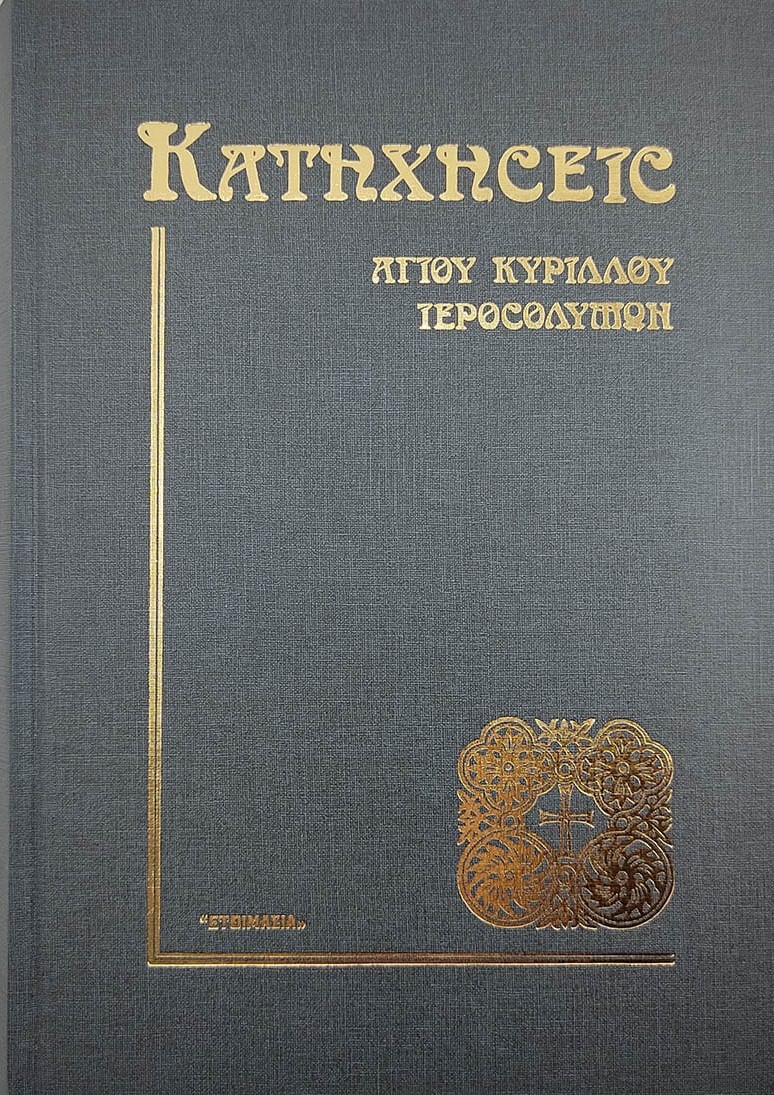 St. Cyril himself gives us the date of his “Catecheses” as fully seventy years after the emperor Probus that is about 347 A.D, providing that he is accurate. The catecheses, or catechetical homilies (lectures), are genuine and are of the greatest interest, both for the history of the Christian faith concerning dogmas, and the true understanding of the liturgy and catechetical methods of the ancient Church.
St. Cyril himself gives us the date of his “Catecheses” as fully seventy years after the emperor Probus that is about 347 A.D, providing that he is accurate. The catecheses, or catechetical homilies (lectures), are genuine and are of the greatest interest, both for the history of the Christian faith concerning dogmas, and the true understanding of the liturgy and catechetical methods of the ancient Church.
Undoubtedly, Saint Cyril of Jerusalem is one of the most important sources we have for how the church celebrated the Divine Liturgy and Mysteries (see Mystagogical Catecheses) during the first few decades after the legalization of Christianity.
In particular, in these 24 homilies, Saint Cyril instructs new Christians in the days immediately before and after their initiation into the life of the Church. In these homilies we find very strong insistence on the value and efficacy of the mystery of baptism as well as heavy emphasis on the real presence of Christ’s body and blood in the mystery of the Divine Communion.
They include an introductory homily, the “procatechesis”, followed by eighteen instructions delivered in Lent to those who were preparing for baptism, and five “mystagogical” instructions given during Easter week to the same persons after their having been baptized. They contain interesting local references to the finding of the Holy Cross, the position of Golgotha in relation to the walls of the Holy City, to the other holy places, and to the great basilica of the Resurrection built by Constantine in which these conferences were delivered in 348 A.D or 350 A.D. They seem to have been spoken extempore, in the first place, and written down afterwards.
Briefly, the Catechetical Homilies are among the most valuable remains of Christian antiquity and especially for an Orthodox Christian they speak volumes of the continuity of the authentic faith throughout the centuries. According to Cyril, the faith is to be proved out of Divine Scripture. That is why his text is rich in scriptural references. Also, he gives us the canon of the Scripture according to his understanding (Concerning the Divine Scriptures, Cat 4, 33-37). It is noteworthy that at that time the canon had not been officially defined by the Church. Additionally, St. Cyril gives us an account of the heresies of the time (Concerning Heresies, Cat 6, 12-36).
In particular, the material of the Catechetical Homilies is divided as follows:
Procatechesis
Eighteen Catechetical Homilies to those who are to be Enlightened:
Homily 1. An Introductory Homily to those who had come forward for Baptism
Homily 2. On Repentance and Remission of Sins and Concerning the Adversary
Homily 3. On Baptism
Homily 4. On the Ten Points of Doctrine
Homily 5. On faith
Homilies 6-18. On the Articles of the Creed
And finally,
Five Mystagogical Catecheses:
Homily 1: To the Enlightened
Homily 2: On Baptism
Homily 3: On Chrism
Homily 4: On the Body and Blood of Christ
Homily 5: On the Mysteries. On the Divine Liturgy and Communion.
Saint Cyril’s Catecheses are included in Patrologia Graeca, Volume 33.
Copyright © 2021 by Orthodox Christian Association «ΧΡΙΣΤΙΑΝΙΚΗ ΕΛΠΙΣ» ΟΡΘΟΔΟΞΗ ΑΔΕΛΦΟΤΗΤΑ. Used by permission. All rights reserved.
Dr Despoina M. Kalogeraki, Bth, Mth, PhD
The Purpose of Agogi (Upbringing/Education)
 The purpose of Christian agogi, according to St. Chrysostom is the act of shaping a child into an icon of God1. Thus, he exhorts the parents “to raise their children” as if they were raising “athletes in Christ”. He counsels them that though they live in the world (Gk κόσμος) they should teach their children το be pious from their first steps2.
The purpose of Christian agogi, according to St. Chrysostom is the act of shaping a child into an icon of God1. Thus, he exhorts the parents “to raise their children” as if they were raising “athletes in Christ”. He counsels them that though they live in the world (Gk κόσμος) they should teach their children το be pious from their first steps2.
The purpose of Christian pedagogy is not secular and “from this world” (Jn 18, 36)· it is rather “Christocentic”, not man-centric but Godman-centric (as Jesus Christ who has two natures, human and divine)3. Thus, it goes without saying that the core of the pedagogy of St. Chrysostom has long-lasting power as it is derived from the divinely inspired Scriptures, the Word of God. That is why referring to a disciple he notes, “even if you have not a teacher to follow his advice you have Jesus’ Christ advice to follow… He is the perfect teacher to obey to”4.
The enlightened father of the Church teaches that as the first human being was created according to the “image” of God (Gen 12:6), likewise every child that is conceived, bears the imprint of God on its soul. It is actually an image of God. This image however, was injured by sin. This injury is now to be healed by the pedagogy in Christ. A pedagogue’s ultimate purpose is to lead his disciples off any kind of sin. Thus, as we have already noted above, its value is priceless.
Furthermore, it goes without saying that a pedagogue is not capable of intervening in the process of the creation of God as it is utterly God’s work. He can however, affect the willingness of a man in order to help him act according to God’s commandments. For, human’s soul “is not bad or good by nature”, on its own. To the contrary, one’s good or bad will makes a person a good or a bad human being5. Thus, the pedagogue, either a parent or a teacher, tries to cultivate children’s will and teach them to abstain from every kind of sin. And, as St. Chrysostom points out, this is where the great responsibility lies. So, it seems that with the proper education-pedagogy, nature is to be overcome6.
Undoubtedly, St. Chrysostom has stressed the pedagogical role of both parents and family as a whole7. What makes somebody a father or a mother, he points out, is not only to give life to their children but to raise them in the proper way, namely in Christ8. Hence, parents have to transform their families to an “ecclesia=church” (Gk ἐκκλησία), which means a gathering of the faithful to worship God. In doing so, “fathers and mothers, by bringing up their children shall not lose their reward”9, he notes. He also develops what we would call today “parental counseling”10 underlining how much the sentimental environment affects the upbringing of children. One cannot expect much when a family resembles to “a ship, while being in a storm, the captain is arguing with the officer at the bow”11. For Chrysostom, marital life and upbringing of children is actually a kind of “a science”12.
...........................
1.PG 62, 154. See also V. Tatakis, Studies on Christian philosophy, ed. Papadimirtiou, Athens 1967.
2. “About vanity and how…, par. 19.
3. See Eph 4, 13.
4. “Have you a teacher who is not virtuous? Still you have Him who is truly a Teacher, whom alone you should call a Teacher. Learn from Him: He has said, “Learn of Me, for I am meek.” (Matt. 11, 29.) Do not take heed, then, to your teacher, but to Him and to His lessons. Take thence thy examples, you have a most excellent model, to it conform yourself”. On Philippians, PG 62, 273. See Heb 12, 2.
5. On Thessalonians 2,4· PG 62, 478.
6. See also, About children’ upbringing, PG 63, 767.
7. “…fathers may be benefited by the virtue of their children, and mothers also, when they have brought them up well. But what if she be herself addicted to wickedness and vice? Will she then be benefited by the bringing up of children? Is it not probable that she will bring them up to be like herself? It is not therefore of any woman, but of the virtuous woman, that it is said she shall receive a great recompense for this also”. See On first letter to Timothy, PG 62, 547 .
8. Just like Anna raised Samuel. See To Anna…, Logos A΄, PG 54, 652-660. See also, On Maccabees…, Homily I, PG 50, 621 See also, To a widow…, PG 51, 329.
9. Ibid.
10. On Ephesians, Homily XX, PG 62, 146-148.
11. On first letter to Corinthians, PG 61, 153.
12. On first letter to Timothy, Homily IX, PG 62, 547.
Copyright © 2021 by Orthodox Christian Association «ΧΡΙΣΤΙΑΝΙΚΗ ΕΛΠΙΣ» ΟΡΘΟΔΟΞΗ ΑΔΕΛΦΟΤΗΤΑ. Used by permission. All rights reserved.
Dr Despoina M. Kalogeraki, Bth, Mth, PhD
The Value of Pedagogy
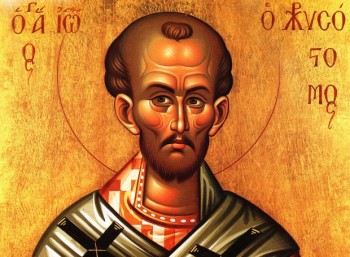 Pedagogy for the eminent father of the 4th century, is “an art above all arts” and “a science superior to all other”1. Every art is useful and every piece of knowledge is necessary. Nevertheless, to know how to form young people’ soul is the ultimate task. If a coppersmith or a goldsmith, St. Chrysostom explains, fashion their pots and vessels with great effort, the teacher, “has a far mightier craft (than theirs)”, namely, “he is beating into shape not vessels of gold, but the soul, which is more precious than all gold, even as the smith hammers out his vessel. For it is no material vessel that he is working at, but he is freeing their soul from all imaginations belonging to this life”2.
Pedagogy for the eminent father of the 4th century, is “an art above all arts” and “a science superior to all other”1. Every art is useful and every piece of knowledge is necessary. Nevertheless, to know how to form young people’ soul is the ultimate task. If a coppersmith or a goldsmith, St. Chrysostom explains, fashion their pots and vessels with great effort, the teacher, “has a far mightier craft (than theirs)”, namely, “he is beating into shape not vessels of gold, but the soul, which is more precious than all gold, even as the smith hammers out his vessel. For it is no material vessel that he is working at, but he is freeing their soul from all imaginations belonging to this life”2.
Moreover, the work of a pedagogue is greater than the work of even, a king. For, the latter is in charge of ruling his town with justice, but the former is expected to lead the soul of youth, which happens to be not an ordinary town but a “golden town”3. Thus, the fact that the soul of a child is a “golden town”, makes the work of a pedagogue valuable and superior to all other professions. Besides, St. Chrysostom exhorts us, “you should consider everything of secondary importance in relation to the care of children”4. For, if we managed to solve all social problems but we failed to solve the issue concerning the pedagogy of children, we would succeed nothing. On the contrary, if we managed to take care of the upbringing of our children, there would be no unsolved problem5. Thus, for St. Chrysostom, the value of the agogi is as much as the value of the soul· and, needless to say, there is nothing equal to soul. For, it is written, “what will it profit (us) if (we) gain the whole world but forfeit (our) life? Or what will (we) give in return for (our) life?” (see Matt 16:26)6.
At this point we should point out what we have already mentioned above namely, the fact that the basis of St. Chrysostom’s pedagogy is his theology. The prototype of the “good and virtuous” (Gk καλός κἀγαθός)7 that was set forth when John Chrysostom studied in Athens near famous teachers and philosophers, who happen to be idolaters, was not enough for him8. Ηis pedagogical ideas were not limited to the human categories. The task of agogi becomes priceless when one acknowledges the value of human life, the value of humans’ soul. Having as starting point that “humans are an icon of God”9 and they are worthy of honor “more than anything in God’s creation”10, Chrysostom as an anthropologist, underlines both the greatness and at the same time, the tragedy of human nature. He teaches that human nature can only be comprehended if proper attention to its origin is to be paid. All humans are God’s live icons. And among all people, children represent “the great legacy”11 that humans have. Hence, the task of pedagogy is the highest one· in Chrysostom’s words, “the art of the arts”12.
.................................................
1. “For teaching (ruling spiritually) is an art, not merely a dignity, and an art above all arts. For if the rule of those without is an art and science superior to all other, much more this. For this rule is as much better than that, as that than the rest· rather, even much more”. See, On Corinthians, PG 61, 506· See also, St. Sakkos, “The art of the arts”Pedagogical courses by St. John Chrysostom, ed. Christianiki Elpida, Thessaloniki 2014.
2. On Acts, PG 60, 204.
3. About vanity and how are the parents supposed to raise their children 54, ΕΠΕ 30, 674.
4. On Ephesians, PG 62, 151.
5. Chrysostom, On Ephesians, PG 62, 151.
6. It has to be noted that in this article the NSRV edition of the Bible is to be followed.
7. See M. Siotis, Christianity and Humanism, Athens 1969.
8. The use of the phrase “καλόςκἀγαθός” is attested since Herodotus and the classical period. The phrase is adjectival, composed of two adjectives, καλός (beautiful) and ἀγαθός (good in the sense of virtuous), the second of which is combined by crasis with καί (and) to form κἀγαθός. There is thematic discussion of kalokagathia (καλοκαγαθία noun) in Aristotle’s Eudemian Ethics (Book VIII, ch. 3 (1248b).
9. “For if men for making statues and painting portraits of kings enjoy so great honor, shall not we who adorn the image of the King of kings, (for man is the image of God,) receive ten thousand blessings, if we effect a true likeness?”. See, On Ephesians, PG 62, 154.
10. On the Gospel of John, ΕΠΕ 14, 32.
11. On Ephesians, PG 62, 546.
12. On Corinthians, PG 61, 506.
Copyright © 2021 by Orthodox Christian Association «ΧΡΙΣΤΙΑΝΙΚΗ ΕΛΠΙΣ» ΟΡΘΟΔΟΞΗ ΑΔΕΛΦΟΤΗΤΑ. Used by permission. All rights reserved.
From the Book
The Catechetical Homilies of St. Cyril Archbishop of Jerusalem
Edited by Despoina M. Kalogeraki, Ph.D.
Published by Orthodox Missionary Fraternity of Thessaloniki
Thessaloniki 2011
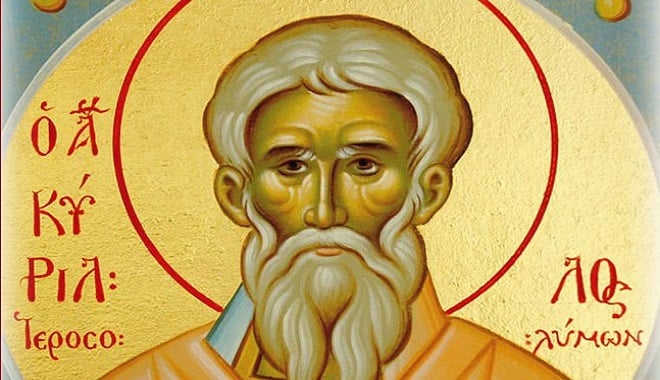 St. Cyril, bishop of Jerusalem and one of the “Fathers of the Church”, was born most probably in Jerusalem about 316 A.D, just about the time the emperor Constantine legalized Christianity in the Roman Empire (313 A.D.) and reposed in peace probably 18 March 386 A.D, shortly after the Second Ecumenical Council of Constantinople (381 A.D) which completed the Creed often known as the Nicene Creed. In the East his feast is observed on the 18th of March. Little is known of his life. We gather information concerning him from his younger contemporaries, Epiphanius, Jerome and Rufinus, as well as from the fifth-century historians, Socrates, Sozomen and Theodoret.
St. Cyril, bishop of Jerusalem and one of the “Fathers of the Church”, was born most probably in Jerusalem about 316 A.D, just about the time the emperor Constantine legalized Christianity in the Roman Empire (313 A.D.) and reposed in peace probably 18 March 386 A.D, shortly after the Second Ecumenical Council of Constantinople (381 A.D) which completed the Creed often known as the Nicene Creed. In the East his feast is observed on the 18th of March. Little is known of his life. We gather information concerning him from his younger contemporaries, Epiphanius, Jerome and Rufinus, as well as from the fifth-century historians, Socrates, Sozomen and Theodoret.
He spent his whole life in Jerusalem where was consecrated bishop of the Holy City of David about 348 A.D by Acacius of Caesarea. St Cyril was banished from his Jerusalem see a total of three times for his bold proclamation of faith in Christ’s full divinity during a time when many bishops and emperors were in favour of various forms of the Arian1 heresy. Being zealous for the Orthodox faith, he was exiled three times by the Arian Emperors Constantius and Valens.
St. Cyril attended the great Council of Constantinople in 381 A.D, the Second Ecumenical Council, at which Theodosius ordered the Nicene faith (the one of the First Ecumenical Council of Nicaea in 325 A.D), now a law of the empire, to be promulgated. According to the Second Council of Constantinople Cyril proved himself to be one of the greatest fighters against Arianism.
The extant works2 of St. Cyril of Jerusalem include a sermon on the Pool of Bethesda, a letter to the emperor Constantius describing a wonderful cross of light extending from Golgotha to the Mount of Olives, a cross which appeared in the air during the celebration of Pentecost in 351 A.D, four small fragments of other homilies of his, and the famous “Catecheses”, which are presented in this book and which are among the most precious remains of Christian antiquity.
............................
1. Arianism is the theological teaching of Arius (250-336 A.D.), a Church priest, who was deemed a heretic at the First Ecumenical Council of Nicaea in 325 A.D. and pronounced a heretic again after his death at the Second Ecumenical Council of Constantinople in 381 A.D. According to the heretic Arius, God the Father and the Son did not exist together eternally. The Son was not God himself but he was created by the Father in time.
2. See Patrologia Graeca 33, 331-1180.
Copyright © 2021 by Orthodox Christian Association «ΧΡΙΣΤΙΑΝΙΚΗ ΕΛΠΙΣ» ΟΡΘΟΔΟΞΗ ΑΔΕΛΦΟΤΗΤΑ. Used by permission. All rights reserved.
Dr Despoina M. Kalogeraki, Bth, Mth, PhD
 It is a fact that St. Chrysostom, “the great ecumenical teacher”, as the Orthodox Church chants, has not written a, let us say, systematic pedagogical piece of work, in the strict sense of the word. However, if we were to study his hermeneutical works thoroughly, we would gather a treasure of teaching elements about pedagogy (Gk παιδαγωγία). He actually belongs to the chorus of founders of Christian pedagogy. Since his pedagogy is being based on theology, it has undoubtedly a timeless value. St. Chrysostom was not a philosopher1. On the contrary, he was a theologian whose teaching was first and foremost, a living experience. It is said that St. Chrysostom was the stubborn champion of assiduous Bible reading, even among the laity. This very fact makes his pedagogical principles part of his theology.
It is a fact that St. Chrysostom, “the great ecumenical teacher”, as the Orthodox Church chants, has not written a, let us say, systematic pedagogical piece of work, in the strict sense of the word. However, if we were to study his hermeneutical works thoroughly, we would gather a treasure of teaching elements about pedagogy (Gk παιδαγωγία). He actually belongs to the chorus of founders of Christian pedagogy. Since his pedagogy is being based on theology, it has undoubtedly a timeless value. St. Chrysostom was not a philosopher1. On the contrary, he was a theologian whose teaching was first and foremost, a living experience. It is said that St. Chrysostom was the stubborn champion of assiduous Bible reading, even among the laity. This very fact makes his pedagogical principles part of his theology.
Being an eminent pedagogue and, as a matter of fact, excellent connoisseur of human psychology2, St. Chrysostom with his teaching has introduced a timeless, integrated pedagogical system.
The period that Chrysostom lived (344/354-407), was a rather difficult time in many aspects. That is why Christian teaching was accepted by people from every social class. During this very period, spiritual fathers of the Church, apart from St. John Chrysostom, having as a starting point the teaching of the Holy Scripture and simultaneously, based on the Holy Tradition (Gk Παράδοσις)3, have studied fundamental issues of the education (Gk ἀγωγή “agogi” meaning the act of leading), in other words, issues concerning pedagogy (Gk παιδαγωγία meaning leading young people-παῖδες- by teaching). Thus, the foundation of what we call “Christian pedagogy”4 has been laid by a number of Christian teachers of that period.
All these enlightened teachers were inspired by the teaching of the foremost teacher, the Lord Jesus Christ Himself. We also have to mention the pedagogical concepts of St. Paul5 who was the most eminent pedagogue in Christ (Gk ἐν Χριστῷ), as well. His teaching exemplifies the connection and interdependence between theology and pedagogy in Christ. For, as St. Paul confesses “it is no longer I who live, but it is Christ who lives in me” (Gal 2:20)6. Thus, he is the one who embodies the teaching of Jesus Christ the Teacher and our Savior.
Let us briefly refer to the pedagogical works of the teachers of the first Christian centuries, during which fathers of the Church have actually formed the pedagogical system of the Church. It has been accurately said that Christianity is a “religion of pedagogy”7. I esteem that it is a very proper characterization as its ultimate goal is to lead all people who are God’s children, to their final destination, namely near God. For, God “desires everyone to be saved and to come to the knowledge of the truth (1Tim 2, 4).
Moreover, during that “golden” period of the history of the Christian Church, there were people who have written relative works. Firstly, Clement of Alexandria (2nd century), has written the “Pedagogue”8, Basil the Great (+379), John Chrysostom (+407), as an ecclesiastical teacher and preacher at the same time9, Jerome (+420) and St. Augustine (+430). Additionally, St. Cyril of Jerusalem (+386) has written the Catecheses10, St. Gregory of Nyssa (+394) and Kassianos the Roman (end of the 4th century)11 as well. All the above mentioned, have put together the axioms that form the Christian pedagogy, which is not a secular approach to the issue of counseling young people but an approach through the prism of Christian theology. These axioms and principles stay unchanged in our spiritual tradition and remain valid till today. Contemporary teachers, ascetics like St. Prorfyrius, Paisius the Athonite, Sofronios of Essex and many others have continued to espouse and underscore the principles of pedagogy that have been laid on the basis of Orthodox theology.
Specifically, the pedagogical and phycological principles of the teaching of St. Chrysostom, are embedded in many of his pieces of work12 but there are some of them that would be of special interest to our subject matter13. Namely, homily “to a widow must be said that…”, homily “to Anna…”, homily 21st “on Ephesians”, homily 9th “on the first letter to Timothy”, homily 27th “about children’ upbringing”, Logos 3nd “to a faithful father”, homily 21st “on the Gospel of Matthew” and homily “About vanity and how are parents supposed to raise up their children”14.
Let us have a look at some of John Chrysostom’s fundamental pedagogical ideas. We will explore some ideas concerning the value and the purpose of “agogi” and the profile of a pedagogue as well, according to Chrysostom’s pedagogical system. Examining these aspects of St. Chrysostom’s pedagogical ideas, we will witness the interrelation between theology and pedagogy in his thought.
....................................
1. As he actually notes in his exegesis “you teach by words? But this is easy, to philosophize in words: teach me by your life· that is the best teaching. You say that it is right to be moderate, and you make a long speech about this thing, and play the orator, pouring forth your eloquence without a check?” St. Chrysostom, On Acts, Homily XXX.
2. A. Danassis, Johannes Chrysostomos, Pädagogisch – Pshychologische Ideen in seinem Werk, PhD work, Bonn, 1971, Bouvier Verlag Herbert Grundmann. Also, see S. Seidlmayer, Die Pädagogik des Johannes Chrysostomus, München, 1923, Münster, 1926.
3. Gk ἹεράΠαράδοσις, meaning the teaching of the Holy Scripture as it is interpreted by the very life of the Church. There are four main sources, the Word of God laid down in the Holy Scripture, the definitions of the Councils, the liturgical texts and the writings of the Fathers. For the Orthodox Church, the Holy Scripture on the one hand and the Holy Paradosis (tradition) on the other are the two pillars of its faith.
4. J. Kogoulis, Catechetical and Christian Pedagogy, ed. Kyriakidis, Thessaloniki 1990.
5. A. Mpitsakis, The education of man according to St. Paul, ed. Gregory, Athens 1968
6. References from the Bible, as well as abbreviations of them (see pp. xxvii-xxviii) follow New Standard Revised Version of the Bible.
7. D. Moraitis, Pedagogical ideas of the three Hierarchs, ed. Gregory, Athens 1968.
8. Clement of Alexandria, All works, The Pedagogue, 1 EΠΕ, 112, ed. “Gr. Palamas”, 1992.
9. See P. Mpratsiotis, The revival of the Three Hierarchs through the centruries, ed. Ap. Diakonia, Athens 1972.
10. St. Cyril of Jerusalem, Catecheses, ed. “Etoimasia”, Kareas 1991.
11. Abbas Kassianos, Talking with the fathers of the desert, ed. “Etoimasia”, Kareas 2004 (vol. A), 2006 (vol. B).
12. See bibliography
13. For the English translation in this article, Philip Schaff’s translation is followed wherever necessary.
14. Concerning this homily there is a dispute among the interpreters with regard to its fraternity. See D. Moraitis, John Chrysostom’s pedagogy, About vanity and how are the parents supposed to raise their children, Library “Papyrus”, n. 96, Athens 1940. With regard to the fraternity issue see pp. 3-20.
Copyright © 2021 by Orthodox Christian Association «ΧΡΙΣΤΙΑΝΙΚΗ ΕΛΠΙΣ» ΟΡΘΟΔΟΞΗ ΑΔΕΛΦΟΤΗΤΑ. Used by permission. All rights reserved.
By Saint John Chrysostom
 I am your father, your brother, your bridegroom, your home, the one who brings you up, your cloth, your root, your foundation. I am all whatever you may wish for, in order not to be in need of anything.
I am your father, your brother, your bridegroom, your home, the one who brings you up, your cloth, your root, your foundation. I am all whatever you may wish for, in order not to be in need of anything.
I will be your servant too, for I came to serve, not to be served. I am your friend and member, your head and brother, sister and mother. I am all for you. Only stay closely to me.
I became poor and a wanderer for you. I was hung on the cross for you, placed in the tomb for you. In heaven I pray for you to the Father. I was sent by my Father for your sake and I came to earth. You are everything to me, brother, and co-heir, a friend and member. What more would you ask for? Why do you turn away from Him, who loves you so much?
Saint John Chrysostom, On Matthew 76,5· PG 58,700
 God’s love united earth to Heaven. God’s love seated man on the kingly throne. God’s love manifested God upon earth.
God’s love united earth to Heaven. God’s love seated man on the kingly throne. God’s love manifested God upon earth.
God’s love made him, the Beloved, surrender to death for the sake of his enemies, of those who hate the Son...
God’s love didn’t stop here, but called us to more greater things. God didn’t only release us from our former evils, but promised to bestow upon us other much greater blessings.
For all these things, then, let us give thanks to God, and follow after every virtue and above all things, let us with complete precision practice love that we may be counted worthy to attain the promised blessings.
Saint John Chrysostom, Commentary on the Ephesians 9,4· PG 62,74-75
Copyright © 2021 by Orthodox Christian Association «ΧΡΙΣΤΙΑΝΙΚΗ ΕΛΠΙΣ» ΟΡΘΟΔΟΞΗ ΑΔΕΛΦΟΤΗΤΑ. All rights reserved.
MESSAGES ABOUT “HOPE” FROM THE THREE HIERARCHS
Γράφτηκε από Super UserMessages about “Hope” from the three Hierarchs:
Basil the Great, John Chrysostom and Gregory the Theologian
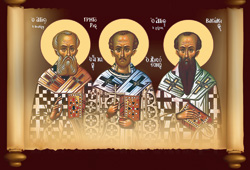 The three holy Hierarchs have been rightly characterized as the preachers of hope. In their wonderful writings they often refer to this subject, which nowadays is so relevant and necessary for everyone. Modern people experience insecurity and despair. The three saints Hierarchs can support and comfort us through the only "Living hope" of the world, Lord Jesus Christ.
The three holy Hierarchs have been rightly characterized as the preachers of hope. In their wonderful writings they often refer to this subject, which nowadays is so relevant and necessary for everyone. Modern people experience insecurity and despair. The three saints Hierarchs can support and comfort us through the only "Living hope" of the world, Lord Jesus Christ.
1. Blessed is the one who rests his hope in God only and not to the hope that the world offers... (M. Βασιλείου, Εἰς Ἠσαΐαν 10· PG 30,549C-D) (Basil the Great, On Isaiah 10, PG 30,549C-D).
2. God, the Holy One, promises to those who have their hope in Ηim, to give them a way out of sorrow. Therefore, despite the fact that we have reached the ultimate limit of evil, we do not abandon hope in God, but we try to discern the works of His helping hand (Μ. Βασιλείου, Ἐπιστολαί 242· ΕΠΕ 2,26) (Basil the Great, Letters 242· EΠΕ 2,26).
3. Hope inspires courage for the future, even in times when what is seen leads to despair (Ἰω. Χρυσοστόμου, Εἰς Ψαλμούς 142· ΕΠΕ 7,380) (John Chrysostom, On the Psalms 142, EΠΕ 7,380).
4. We may suffer a lot but we have a powerful hope. We face dangers and intrigues, but we have the Οne who saves us. He is not a human being but God Himself (Ἰω. Χρυσοστόμου, Εἰς Α΄ Τιμόθεον 1,2· ΕΠΕ 23,124) (John Chrysostom, On the First Letter to Timothy 1,2· ΕΠΕ 23,124).
5. In my life, I rely more on You, Jesus Christ, for encouragement than on my own efforts (Γρηγορίου Θεολόγου, Ποιήματα ΟΣΤ΄, ΕΠΕ 10,396) (Gregory the Theologian, Poems 76, ΕΠΕ 10,396).
Copyright © 2021 by Orthodox Christian Association «ΧΡΙΣΤΙΑΝΙΚΗ ΕΛΠΙΣ» ΟΡΘΟΔΟΞΗ ΑΔΕΛΦΟΤΗΤΑ. All rights reserved.
